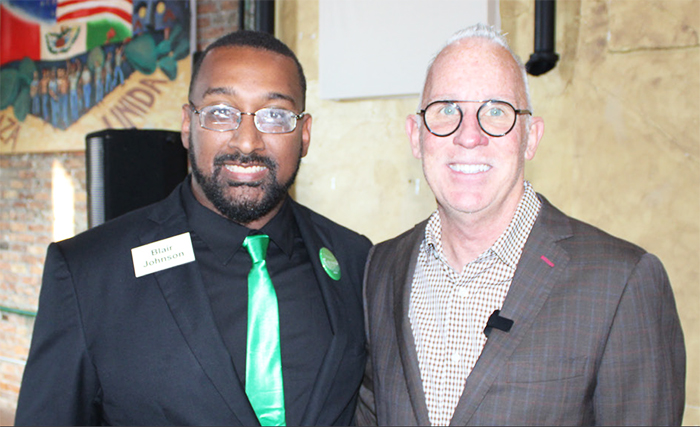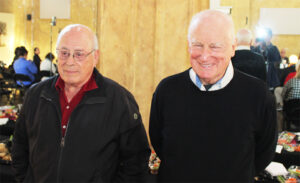
By Fletcher Word
The Truth Editor
La Prensa newspaper hosted a Toledo City Council forum for the candidates vying for the six at-large seats in this year’s election. The forum, held on Tuesday, October 14, at the Sofia Quintero community center on Broadway Street was moderated by Margarita de Leon.
The status of the at-large City Council race changed abruptly, and unexpectedly, in recent weeks when Council President Carrie Hrtman dropped out of the race and resigned her council position to take a job at the University of Toledo (since rescinded). There are now 11 on the ballot; one write-in candidate, Emily Desmond, participated in last week’s forum at the Sofia Quintero.
Opening statements were the first order of business for the candidates. Councilman Mac Driscoll was appointed to council in early 2024 and won a special election later that year to retain his seat. He is an urban planner who has been extensively involved in downtown business development.
Councilwoman Brittany Jones, PhD, who was likewise appointed to council in 2024 and won a special election later that year, is also an urban planner, and is also involved in non-profit work as a planner with United Way.
Rob Pasker, an entrepreneur and real estate agent, spoke of his work in “creating opportunities for families” and his intent, on council, to create pathways to prosperity, to foster safe neighborhoods by supporting small businesses.
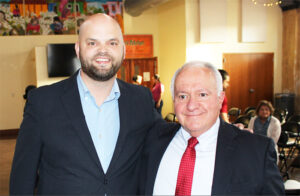
Tom Names, a retired engineer, noted his disappointment in the way government is currently operating in Toledo and his goal to improve home ownership.
Erin Kramer, director of Admissions at Owens Community College, expressed her belief that everyone should have great opportunities and that immigration reform and protecting our immigrants is critical.
Tom Waniewski, a former district city councilman and a television newsman with 25 years of experience, is running again because he regrets the lack of a strong voice on city council.
Councilman George Sarantou, a financial advisor, is running for a third term because there is still a lot of work to do to make the city safer, to make neighborhoods cleaner and to maintain financial stability.
Councilwoman Cerssandra McPherson, a retired teacher’s aide, is running for a third term in order to continue to invest in neighborhoods, to continue to serve.
Ed Beczynski, a restaurateur and the son of immigrants, is running in order to give opportunities to other immigrants and to make neighborhoods clean and safe.
Emily Desmond is the write-in candidate for council and expressed her interest in improving community centers for the benefit of the city’s neighborhoods.
Councilman Nick Komives is running for his third and final term for an at-large council seat. During his term in office, he was surprised that he became so interested in and involved with big issues that impact the lives of all Toledoans such as water quality and climate work.
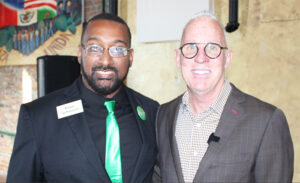
Blair Johnson, an entrepreneur and contractor, wants to bring his different perspective to council, to improve the overall maintenance issues and to speak with residents to gauge their needs and concerns.
Margarita de Leon asked the candidates several questions that were of direct importance to the south Toledo/Latina population such as how to react to the presence of ICE and where to grant amnesty to immigrants in the city.
Perhaps the most important question asked of the candidates was how would they reach into the neighborhood to find community leaders to work with and become involved with city affairs.
“Find out who wants to sit in these seats,” replied Johnson. “Find out who is qualified – we have to ask and we have to be willing to listen.”
Komives noted that during his time on Council he had created a task force to do just that. “When I create something I make sure I bring others in.”
“Meet neighborhood leaders,” answered Beczynski. “We need to continue that – this is a great meeting to do that. We need to listen and there are so many leaders here we need to connect to.”
McPherson observed that community meetings were the way for sitting council members to stay in touch with residents and used, as an example, the issue of the several years when Broadway Street “was a disaster.” She and her council colleagues were able to help businesses along the street through legislation.
“It’s important that we have access to the people in the community – the residents and the workers,” said Sarantou. So many things are accomplished in the city “not just because of the leaders but the residents,” he added.
Waniewski said: “I want to be the voice of those workers who have no voice – I want to be a direct line to city hall.”
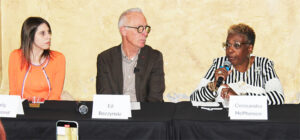 “It is important that we listen to people throughout the city,” said Kramer. “I want to hear directly from residents – with listening sessions and translators are important.”
“It is important that we listen to people throughout the city,” said Kramer. “I want to hear directly from residents – with listening sessions and translators are important.”
Pasker said: “If you are not at the table, you are on the table.” He stressed that it is important to support organizations that are doing the work within the community “to raise up their own leaders.”
The question from de Leon that drew the most passion from the panelists was, essentially, what to do about ICE, should the federal immigration against invade Toledo as it has invaded other cities around the nation.
“How do you plan to protect our people so that they are not arresting innocent people?” de Leon asked.
Sarantou suggested working with federal judges to ensure justice was applied fairly.
Waniewski cautioned against the problem of protests against Ice turning violent.
Names spoke of the necessity of removing illegal immigrants.
However, most spoke of the dangers that ICE presented and said that working with ICE is a non-starter
“Under no circumstances should we cooperate with ICE,” said Driscoll as he extolled the value that immigrants brought to the country and area.
Jones suggested that a warning system is necessary. Calling ICE “a direct threat,” she stressed the necessity of “partnering with the community to find out where [ICE] is.”
McPherson brought the passion. “Can I be real with you?” she asked the audience. There is nothing city council can do, she said, with legislation on the issue of immigration that federal authorities are bound to follow. “We are going to have to hide some folks and keep them here and protect them – we gotta do what we gotta do.”
Beczynski agreed with McPherson and spoke of the experience of his Polish parents hiding a Jewish family during World War II. However, he stressed the need to get immigrants to work in order to help them obtain legal status.
Pasker called the ICE raids and deportation a violation of civil rights as he harkened back to an era 60 years ago.
Komives stepped up the passion on the issue by mentioning that he is terrified for “what can happen in our community.” In 2019, Komives introduced legislation to call Toledo a sanctuary city. It did not pass. “Push back and protect people,” he said of the actions the community must take.
Asked about whether undocumented residents in Toledo should be granted amnesty, all of the candidates answered “yes,” except for Names.
The November 4 general election will narrow the field to six at large council members who will serve four year terms.

